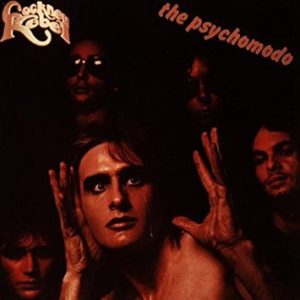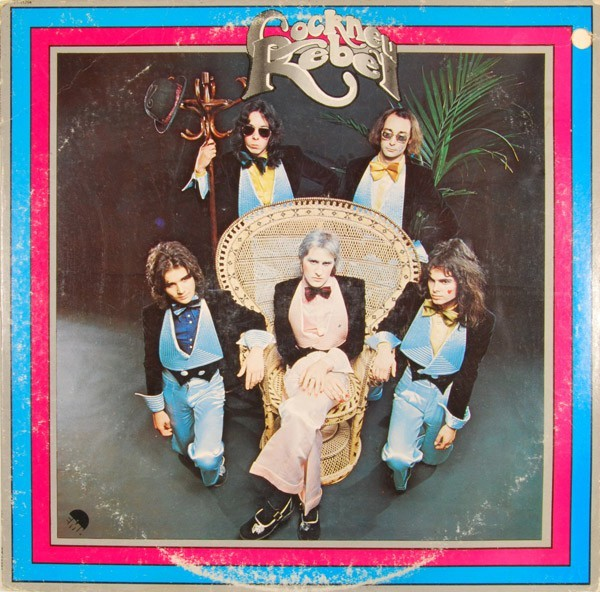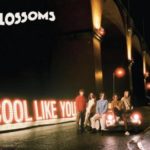If there are three certanties in life, it’s that if you have kids, the only time it will piss down with rain is at school pick up time; that when Queen‘s ‘I Want To Break Free‘ comes on someone will always hilariously (so they think) change the last word of the title to ‘wind’, thinking that they are the first person to do so; and that if you talk about what a brilliant album The Psychomodo is, somebody will ALWAYS, without fail, sneer disapprovingly about its use of the ‘N-word’ on the epic ‘Cavaliers.’ Can I defend the use of that word? Not really. But let’s not forget that back in our less illuminated – relatively recent – past, the use of the word was hardly uncommon, repugnant though it is. So I don’t think it’s fair to mark down an otherwise quite splendid album because of it. Let’s have some context, people.
Still, let’s rewind a little, to the band’s 1973 debut album, The Human Menagerie. Steve Harley must have one of the most distinctive voices in the rock and roll annals, and it’s used to staggering effect on opener ‘Hideaway‘. With tones that seemed to meld Dylan and Bolan with Bryan Ferry, this folksily plucked, shimmersome number is an irresistibly bright introduction to one of the comparitively unsung heroes of our generation, Harley’s almost-out-of-tune vocals predating – and almost certainly influencing – one Peter Doherty some three decades later.
It would be a lie to say that either of these albums are in any way perfect, but somehow, it’s those imperfections which make them so charming. Some of it, as you would expect, is very much “of the time”, so you have the glam rock stomp of ‘Crazy Raver‘ which to some extent apes their contemporaries T.Rex and to a lesser extent The Sweet, while the aforementioned ‘Cavaliers‘ from The Psychomodo is an obvious attempt to cash in on the critical and commercial success of Ziggy Stardust or Hunky Dory, Bowie buzzwords such as ‘suicide‘ and ‘bitch‘ being bandied around willy nilly, but the truth is, it’s when Harley and co are at either their most flippant, or their most ambitious, that they become most effective. So on The Psychomodo, the effervescent single ‘Mr. Soft‘ still stands up alongside anything from the past 45 years as a classic of its genre, but the career defining pinnacle of those early days surely must be the impossibly captivating ‘Death Trip‘ at the end of their debut. Many artists have tried and failed dismally to kink their work with an orchestral bent, but here the whole thing is breathtaking, its modest beginnings belying the thrilling journey we’re about to be taken on. A magnum opus if ever there was one, focusing upon the fatal heroin overdose of a friend, somehow, the song itself sounds like a “hit”, or at least what I would perceive that to feel like, had I any experience in the matter.
Of course, Harley is often playful and ‘Muriel The Actor‘ is testament to this, steel drums introducing the gloriously uplifting number as he sings his opening gambit of “She got my number and she chasing me so far / Me out of slumber, I can do with no faux-pas” – it’s a whole bundle of fun and a big part of what made Cockney Rebel so essential.

The Psychomodo itself was arguably even MORE far reaching, its title track the only one really carrying on that commercial Dylan/Ferry hybrid (to wondrous effect, it must be said), while ‘Singular Band‘ has more in keeping with the group’s first UK hit ‘Judy Teen‘, though there are glimmers of the jazzy punk-funk with which Ian Dury and The Blockheads would later make their name here and there. This was a more expansive release than ‘…Menagerie‘ in scope though, so the Eastern splendour of ‘Ritz‘ caresses and captivates despite not really having anything resembling a chorus. ‘Bed In The Corner‘ is undoubtedly the most radio friendly track ater the obvious single, all winsome and string-laden, like a slightly off-kilter Electric Light Orchestra and I don’t doubt for one moment that Mott The Hoople would have been proud of the marvellous ‘Sling It!‘.
‘Tumbling Down‘, which closes the second album, is more Procol Harum than anything resembling glam rock, and showcases better than anywhere else just how lethal Harley was/is with a ballpoint pen. You only have to let that first line sink in – “Gee, but it’s hard when one lowers one’s guard to the vultures / Now me, I regard it a tortuous hardship that smoulders” to realise we’re in the hands of a lyrical genius here and the rousing finale isn’t too shabby either!
Let me put it simply – if you don’t already own these two albums, there is an almighty Harley shaped hole in your collection, and that, I would suggest, needs addressing immediately.
The Re-issues of The Human Menagerie and The Psychomodo are released on 4th May through Chrysalis.




